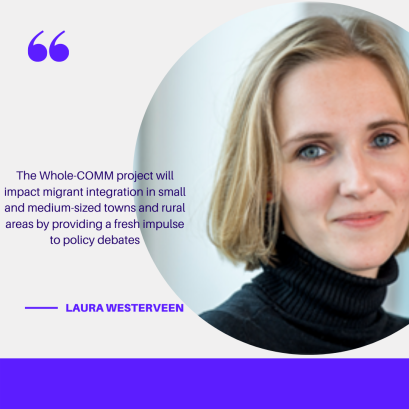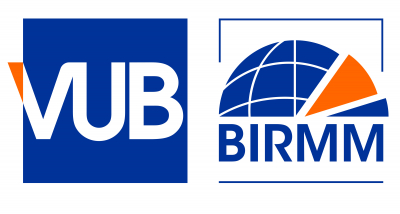
Laura Westerveen is a Postdoctoral Researcher at the Brussels School of Governance and Department of Political Science of the VUB. Laura, together with BIRMM Co-Director Ilke Adam, and Nick Schuermans are part of the BIRMM-VUB team participating in the new H2020 Whole-COMM project. We spoke to her about the new project, the role of BIRMM as a partner, and the expected outcomes of the project.
Can you introduce yourself?
I am Laura Westerveen, a postdoctoral researcher at the Brussels School of Governance and Department of Political Science of the VUB. Together with Ilke Adam and Nick Schuermans, we form the BIRMM-VUB team that participates in the recently started H2020 project Whole-COMM.
Can you tell us about the Whole-COMM project?
Whole-COMM is a Horizon Europe 2020 project that explores the integration of post-2014 migrants in small and medium-sized towns and rural areas. The project studies the integration of these migrants through a Whole-of-Community perspective. The Whole-of-Community perspective conceives of migrant integration as an open-ended process that involves interactions between multiple actors – including citizens, long-term residents and newly arrived migrants as well as state, market and civil society actors – and that takes place in specific local contexts.
What are the aims of this project?
The Whole-COMM project has two main aims. On the one hand, the project aims to push forward knowledge and theorisation on the key dynamics and causal mechanisms that shape the relationship between migrant integration policy and community cohesion or fragmentation. On the other hand, Whole-COMM strives to innovate policy debates and practices by empirically elaborating sets of innovative integration actions – engaging not only migrants but all relevant actors and stakeholders in local communities – to strengthen community cohesion and resilience.
What is the scope of the WHOLE-COMM project?
The Whole-COMM project has started on April 1st, 2021 and has a duration of three years. The project adopts a cross-country and cross-locality comparative approach, including 8 EU and 2 non-EU countries and comprising 40 localities in total. Whole-COMM has a mixed-methods research design that combines qualitative and quasi-experimental methods, a survey on attitudes, and quantitative analysis on the impact of policies on social cohesion and migrants’ integration trajectories.
Can you tell us what is unique about this project?
The Whole-COMM project is unique in its focus on migrant integration in small and medium-sized towns and rural areas. Many of us have at least a vague idea of how big cities address immigration, and that often, big cities are a laboratory for developing innovative migrant integration and anti-discrimination policies. However, less is known about how migrant integration is addressed in small and medium-sized towns and rural areas. The Whole-COMM project will fill in this gap by studying migrant integration across 40 of such localities in 10 different (EU and non-EU) countries.
How will the project realized in Belgium? Which towns will be included? Are you going to conduct interviews, focus groups, other methods?
We are currently working on the final case selection for each country in the project, including Belgium. Therefore, we do not know yet which Belgian towns will be included. What we do know is that we will conduct interviews with officials responsible for reception and integration policies of post-2014 migrants at the local, regional and national level in Belgium as well as with representatives of NGOs and other relevant civil society organizations, and post-2014 migrants themselves. In addition, we will conduct focus groups with both long-term residents and post-2014 migrants and we will carry out participant observation in the selected Belgian towns. We will also map regional and local integration policies, post-2014 migrants’ access to or exclusion from rights and services, and local structures or networks of support. Finally, we will organize workshops with local stakeholders.
How will this project impact migrant integration in small and medium-sized towns and rural areas?
The Whole-COMM project will impact migrant integration in small and medium-sized towns and rural areas by providing a fresh impulse to policy debates. To this purpose, the project will generate new comparative knowledge and engage with a variety of actors in a structured process of policy learning and co-creation. In this way, Whole-COMM aims to trigger innovation and contribute to building more cohesive and resilient communities.
Can you tell us who are the various partners involved and how will the existing expertise in BIRMM contribute to the success of this project?
The Whole-COMM project is a collaboration between 12 partner organizations, coordinated by Collegio Carlo Alberto, Italy. The BIRMM-VUB team participates in several work packages and will conduct fieldwork in 3 to 4 small and medium-sized towns in Belgium. We are excited to start working on the project and further develop interdisciplinary expertise on migration and diversity at the local level in Belgium and beyond.
The outcomes of the Whole-COMM project can be followed on its website.
